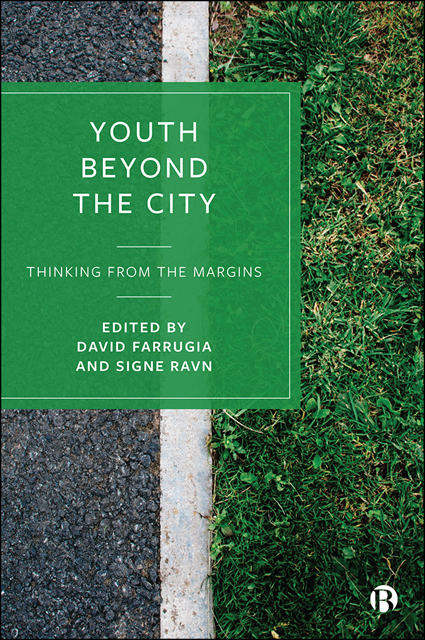Book contents
- Frontmatter
- Contents
- List of Figures and Tables
- Notes on Contributors
- Introduction: Thinking from the Margins
- Part I Inequalities: Education and Aspiration on the Margins
- Part II Materialities: Spatiality and Sensory Embodiment
- Part III Identities: Mobility, Rootedness and Belonging
- Part IV Temporalities: Historicizing Space and Place
- Index
Introduction: Thinking from the Margins
Published online by Cambridge University Press: 13 October 2022
- Frontmatter
- Contents
- List of Figures and Tables
- Notes on Contributors
- Introduction: Thinking from the Margins
- Part I Inequalities: Education and Aspiration on the Margins
- Part II Materialities: Spatiality and Sensory Embodiment
- Part III Identities: Mobility, Rootedness and Belonging
- Part IV Temporalities: Historicizing Space and Place
- Index
Summary
Introduction
The intellectual frameworks that guide contemporary thinking about youth are shaped according to distinctions that are at once spatial and epistemological. Distinctions between the urban and the rural, the global north and the global south, and the centre and the periphery underpin how academic and social policy actors locate, understand and intervene in youth. These frameworks position certain young people (especially those in the urban centres of the global north) as intrinsically interesting and emblematic of youth in general, representing globally desirable ways of life. They allocate others to marginal positions, rendered uninteresting or constituted as objects of intervention within projects (such as ‘global citizenship’ or economic development schemes) that contribute to the valorization or devalorization of differently positioned youth and to the aspirations of powerful institutional actors. These positions of marginality also reflect long-standing theoretical histories and geographies of knowledge production that underpin the disciplines that study young people's lives. Concepts such as modernity, globalization and youth itself have all been written from the perspective of the urban centres of the global north, which are positioned as the critical sites of epistemological investment – the place to be in order to create significant knowledge and access critical social processes. The margins produced through these investments are thereby rendered unproductive and unimportant.
In this context, this book offers a new conceptual and epistemological project – to think productively about youth from a position of spatial marginality. The aim is to make visible economic, cultural and personal processes that are invisible from the perspective of the ‘centre’ of the urban metropolis. In particular, the aim of this book is to think critically and productively about space and the materialities of place, including how these materialities contribute to connections and divergences shaping young people located outside of the major cities. From this position, the book creates new, critical perspectives on globalization and mobility, as well as contributing to existing concerns including education, citizenship, work, leisure and consumption. The book decentres the dominant urban focus in youth sociology to build new theory from the perspective of young people that are both spatially and epistemologically marginal to the field as it stands.
- Type
- Chapter
- Information
- Youth beyond the CityThinking from the Margins, pp. 1 - 18Publisher: Bristol University PressPrint publication year: 2022



